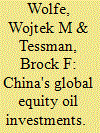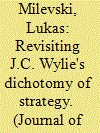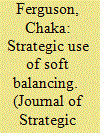|
|
|
Sort Order |
|
|
|
Items / Page
|
|
|
|
|
|
|
| Srl | Item |
| 1 |
ID:
112632


|
|
|
|
|
| Publication |
2012.
|
| Summary/Abstract |
In this article, we construct and analyze an original database of overseas Chinese equity oil investments (EOI) in order to assess the relative importance of economic and geopolitical factors in determining the type of countries that are most likely to receive those investments. We find that China's national oil companies (NOCs) choose to make considerable investments in certain oil rich countries while ignoring others. We develop and examine 'economic opportunity' and 'geopolitical relevance' explanations of Chinese EOI. The economic explanation assumes that Chinese oil companies operate autonomously despite the fact that they are state owned, and that they seek international experience in countries offering less competition but more risk. The geopolitical explanation suggests that Chinese equity oil investments are developed and coordinated by the central government as part of a geopolitical strategy that is designed to bypass the so-called 'Malacca Dilemma' and deepen security ties with oil-rich states through the conduct of oil diplomacy. We argue that Chinese EOI tends to reflect both corporate interests and government priorities, and that it generates more liabilities rather than benefits for China.
|
|
|
|
|
|
|
|
|
|
|
|
|
|
|
|
| 2 |
ID:
112635


|
|
|
|
|
| Publication |
2012.
|
| Summary/Abstract |
While the success of Colombia's fight against illegal armed groups, led by Fuerzas armadas revolucionarias de Colombia - ejército del pueblo (FARC-EP), is generally lauded as evidence of the effectiveness of both COIN doctrine and security assistance, the configuration of Colombia's counter-insurgency effort remains largely unstudied. This article will explain the success of one of those campaigns carried out principally by the Colombian marines (Colmar) in an area of northern Colombia known as the Montes de María. Contingent factors shaped the success of this campaign, beginning with the fact that the Montes de María forms an area where insurgents, relative late comers to the region, found it difficult to put down deep roots. However, operations to eradicate them were complicated by the inexperience of the Colmar, and by constraints placed by Colombia's Constitutional Court on COIN methods modeled on those successfully applied by the British in Malaya and Kenya. Therefore, Colmar officers initiated their five-year campaign by building up a base of popular support in the towns and targeting insurgent logistical networks. This bought time to strengthen the Colmar's combat and intelligence capabilities, and take the offensive that eventually isolated and killed the leader of the FARC in the Montes de María, Martín Caballero. Unfortunately, the failure of the Colombian government to follow up the Colmar victory by installing a regional and local governments viewed as legitimate by the population, and to resolve long standing land tenure issues, has meant that, so far, the Colmar looks to have delivered a tactical victory in a strategic vacuum.
|
|
|
|
|
|
|
|
|
|
|
|
|
|
|
|
| 3 |
ID:
112634


|
|
|
|
|
| Publication |
2012.
|
| Summary/Abstract |
J.C. Wylie presented his dichotomy of sequential and cumulative operational patterns in a context of effect through control, not victory or peace, as the objective of war. The author refines concepts of control presented by Rosinski, Eccles, Schelling and Corbett and presents its three facets (taking, denying, exercising) to develop a model of control as manipulation of the opponent's operational choices. This concept of control, when applied to sequential and cumulative strategy, reveals the effect each has operationally and, from there, strategically, in the primary arenas and forms of engagement (land, sea, air and cyberspace; conventional, guerrilla, terrorism, special operations).
|
|
|
|
|
|
|
|
|
|
|
|
|
|
|
|
| 4 |
ID:
112633


|
|
|
|
|
| Publication |
2012.
|
| Summary/Abstract |
This article examines Chinese and Russian foreign policy and military strategy from the theoretical standpoint of soft balancing. Analysis of their thinking indicates that both seek to offset US military superiority without engaging American power directly. To that end, Chinese and Russian strategists have adopted 'soft' or 'normative' power assets as strategic capabilities in their military and foreign policy. Alternative norms, such as the concept of 'sovereign democracy', allow China and Russia to deliberately ignore human rights issues in order to achieve diplomatic advantage with respect to the United States. The two powers have institutionalized these norms within the Shanghai Cooperation Organization, which they use to counterbalance US interests in Central Asia.
|
|
|
|
|
|
|
|
|
|
|
|
|
|
|
|
|
|
|
|
|